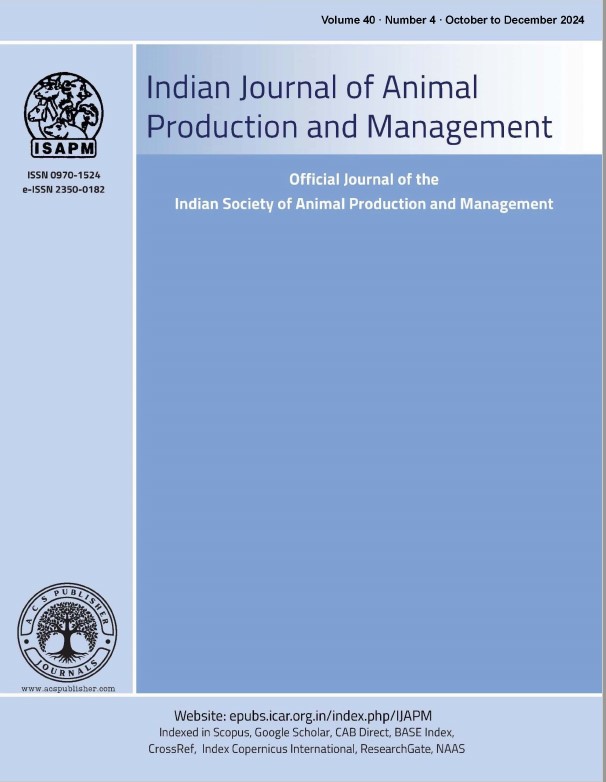A Study on the Presence of Supernumerary Teats in Dairy Cattle
DOI:
https://doi.org/10.48165/ijapm.2023.37.3.2Keywords:
Crossbred cattle, supernumerary teats, udderAbstract
Supernumerary teat (SNT) in cattle, which is the presence of having additional teats, may affect the milk production as well as the management. SNTs can pose a serious problem when it comes to machine or robotic milking. The present work was planned with the objective of studying the presence of SNTs in the Holstein Friesian Crossbred (HFCB) and Jersey Crossbred (JCB) cattle. The results revealed that SNTs were present in 12.27% HFCB and 8.67% JCB cows. The SNTs were either one or two in number, with the incidence of one SNT being higher than the incidence of two SNTs in HFCB cows, whereas the incidence of one and two SNTs were equal (50%) in JCB cows. Overall, the occurrence of one SNT was significantly more in HFCB cows than the JCB cows, whereas the occurrence of two SNTs were significantly more in JCB cows than HFCB cows. The SNTs were found to be located at three different positions viz. anterior, intercalary or caudal location. SNTs were located at intercalary position in 82.35% of HFCB cows, whereas the remaining 17.65% HFCB cows had SNTs located at anterior location. SNTs were located at anterior, intercalary and caudal location in 17.86%, 32.14% and 50% JCB cows.
References
Blowey, R.W. and Weaver, A.D. 2011.
Udder and teat disorders. R.W.B.D. Weaver
(Ed.), Color Atlas of Diseases and Disorders
of Cattle (3rd), Mosby, Edinburgh, UK
(2011), pp. 203-219
Pausch, H., Jung, S., Edel, C., Emmerling,
R., Krogmeier, R., Gotz, K.U. and Fries, R.
Genome-wide association study
uncovers four QTL predisposing to
supernumerary teats in cattle. Animal
Genetics. 43(6): 689-95.
Martin, P., Palhiere, I., Klopp, G.T. and
Rupp, R. 2016. Heritability and genome-
wide association mapping for
supernumerary teats in French Alpine and
Saanen dairy goats. Journal of Dairy
Science. 99(11): 8891-8900.
Brka, M., Reinsch, N. and Kalm, E. 2002.
Frequency and heritability of supernumerary
teats in German Simmental and German
Brown Swiss cows. Journal of Dairy Science. 85(7): 1881-6.
Hamadani, H. and Khan, A. 2015. Automation in livestock farming–A technological revolution. International Journal of Advanced Research. 3(5): 1335– 1344.
Lewis, C. 2016. Supernumerary Teats In Cattle and Goats. Heritage Animal Health. Animal Health. Information https://www.heritageanimalhealth.shop/blog
s/information/supernumerary-teats-in-cattle and-goats
Hamadani, H., Khan, A., Banday, M., Ashraf, I., Handoo, N., Bashir, A. and Hamadani, A. 2013. Bovine mastitis-A disease of serious concern for dairy farmers. International Journal of Livestock Research. 3(1): 42–55.
Wani, A.Y., Khan, A., Hamadani, H., Sheikh, I., Banday, M., Akand, A., Shahnaz, S. and Baba, S. 2023. Constraints faced by yak and yak cross rearing communities of Ladakh Region. SKUAST Journal of Research.
(1): 90–95.
Hamadani, H., Khan, A., Azmat and Banday, M.T. 2019. Constraints perceived in dairying by the farmers in city conditions. Indian Journal of Animal Production and Management. 35(1-2): 3–56.
Hamadani, H., Khan, A., Wani, Shabir A, Khan, H., Banday, M. and Wani, S.A. 2020. Economics of milk production and profitability of different cow unit sizes in Srinagar. Indian Journal of Animal Sciences.
(7): 1065–1069.
Hamadani, H., Khan, A.A., Banday, M.T. and Khan, H.M. 2020. Comparative analysis
of performance traits of different dairy cattle reared in the Srinagar City of J&K. Asian Journal of Dairy and Food Research. 39(2): 135–138.
Anonymous. 2016. Hand Book of Right to Information. Animal and Sheep Husbandry Department. Government of Jammu and Kashmir, J&K.
Hamadani, H., Khan, A., Sheikh, I., Fazili, M., Khan, H., Haq, Z., Saipriya, G. and Wani, S. 2021. Morphological and Morphometrical Studies on the Crossbred Cows under Temperate Climatic Condition of Kashmir Valley. Asian Journal of Dairy and Food Research. DOI: 10.18805/ajdfr.DR-1688.
Snedecor, G.W. and Cochran, W.G. 1989. Statistical Methods. Oxford and IBH Publishing Company, New Delhi.
Grădinaru, A.C., Ciopeică, C. and Munteanu, A. 2021 Congenital supernumerary teats in cows: a review associated with personal observations. ABAH Bioflux. 13(2):39-47.
Sobari, S., Ladds, P.W., Flanagan, M. and Lee, C.G. 1976. A pathological and bacteriological study of the mammary glands of beef cows in north Queensland. Australian Veterinary Journal. 52(10): 458- 61.
Oppong, E.N. and Canaoo, E.A. 1982. Supernumerary teats in Ghanaian livestock: II. Cattle. Beitr Trop Landwirtsch Veterinarmed. 20(3): 303-307.
Rwuaan, J.S. 1979. Studies on bovine congenital defects. Masters thesis submitted to Kansas State University, Manhattan, Kansas

